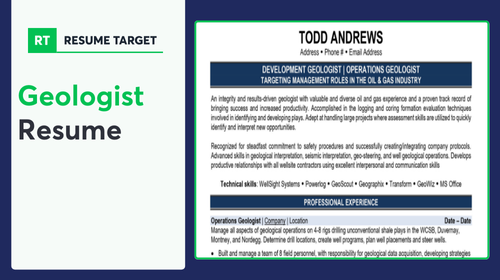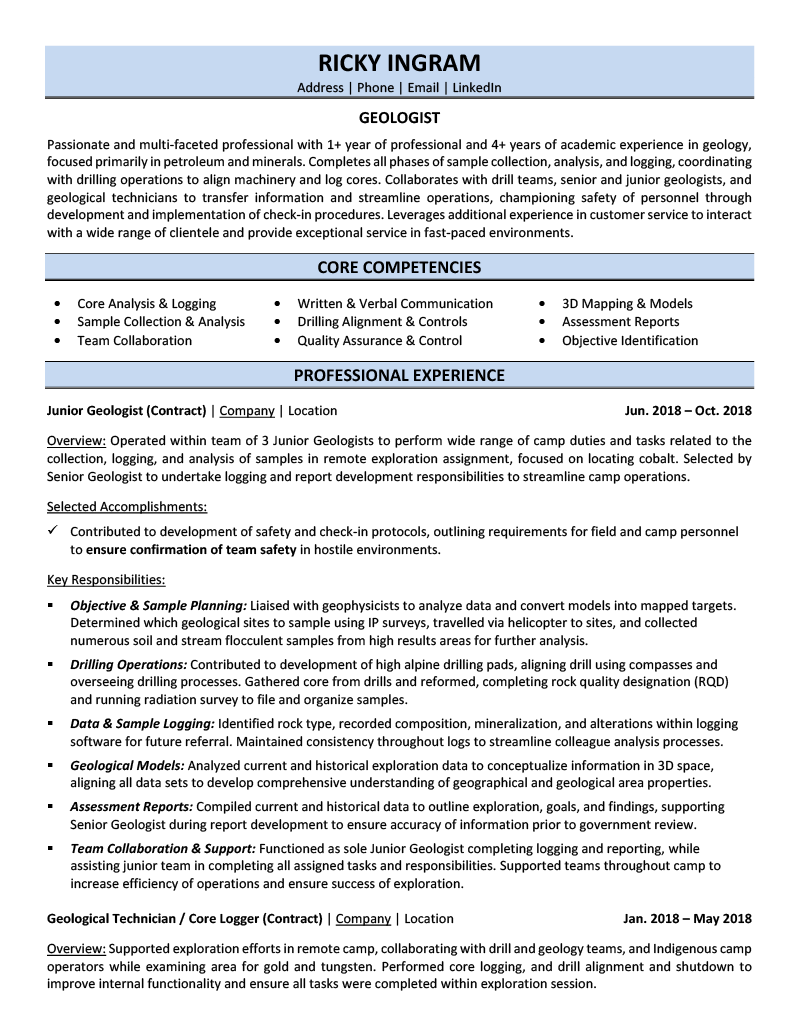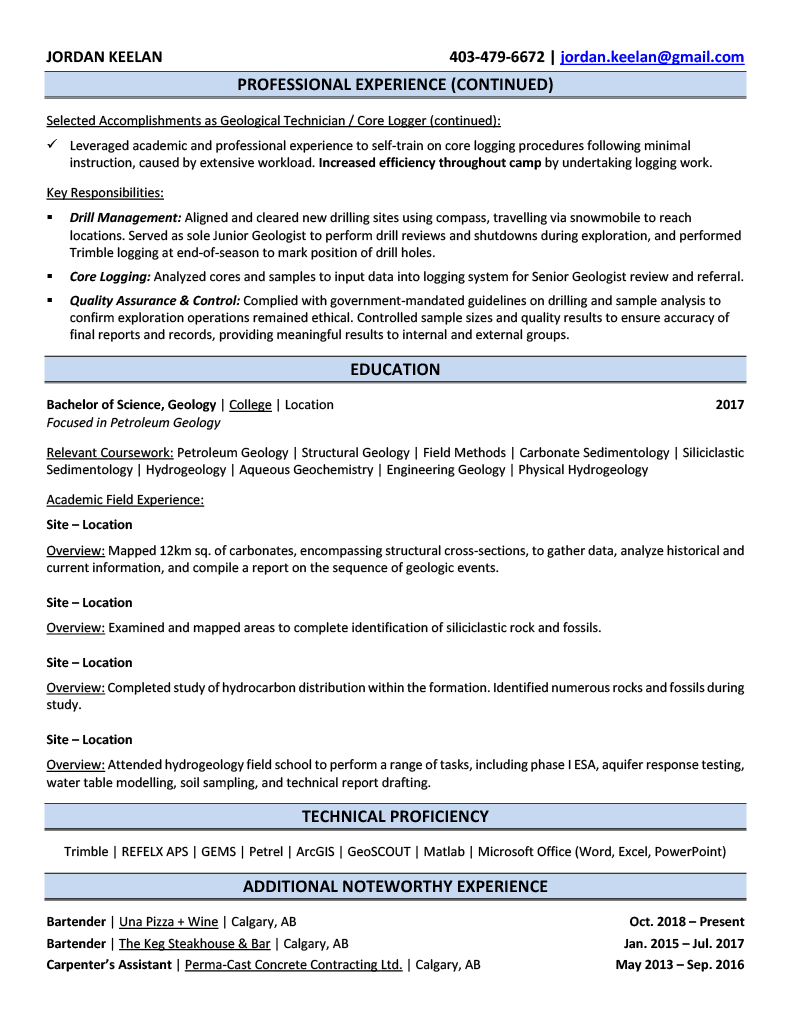

Rock formations, core samples, and field data may be your specialty—but turning that into a strong resume can feel like drilling through bedrock. Geologists often struggle to translate complex fieldwork and technical research into clear, marketable achievements.
Are you finding it challenging to showcase both your scientific expertise and the real-world value of your work? Your resume needs to speak to hiring managers and technical reviewers alike, showing how your geology background supports exploration, project planning, and decision-making.
Resume Target specializes in helping geologists turn their field and lab experience into powerful career documents. We know how to highlight your technical knowledge, analytical skills, and project contributions in a way that gets attention and opens doors.


From mapping earthquake fault lines to discovering new mineral deposits, geologists are Earth's dedicated storytellers who analyze rock samples, conduct field studies, and create detailed geological maps to unlock our planet's secrets.
As a geologist, you'll combine field exploration with laboratory analysis, using sophisticated tools and techniques to study everything from volcanic activity to groundwater systems, helping communities understand and prepare for geological risks while identifying valuable natural resources.
Whether you're passionate about environmental conservation, mineral exploration, or natural hazard assessment, the field of geology offers diverse career paths that can take you from remote mountain ranges to corporate boardrooms, with opportunities to specialize in areas like petroleum geology, environmental consulting, or academic research.
Let's talk about what's exciting in the geology field - your earning potential as a Geologist can be truly impressive! From entry-level positions to executive roles, your compensation can grow substantially as you gain experience and specialize in high-demand areas like petroleum geology.
Figures from: U.S. Bureau of Labor Statistics
Starting as a geologist opens doors to diverse career paths in earth sciences, from field research to environmental consulting. With the right education and experience, you can advance to senior positions earning $90,000+ annually.
Beyond basic geological knowledge, advancing in this field requires a combination of technical expertise and leadership capabilities.
- Geographic Information Systems (GIS) and mapping software - Advanced geological modeling and analysis - Project management and risk assessment - Strong communication and team leadershipBreaking into geology starts with entry-level positions like field technician or research assistant, where you'll gain hands-on experience while working alongside experienced geologists in various environments.
To advance in your geology career, you'll need to master essential skills including fieldwork techniques like observation, mapping, sampling, and navigation, which form the foundation of professional geological work.
Requirements from American Association of Petroleum Geologists
From Texas oil fields to Alaskan exploration sites, geologist jobs cluster in energy hubs and resource-rich regions.
Figures from Zippia
Struggling to translate your field experience, research projects, and technical expertise into a compelling geologist resume that stands out to hiring managers? This comprehensive, section-by-section guide will show you exactly how to structure your resume and highlight your most relevant geological achievements.
As a geologist who can analyze complex geological formations and interpret vast amounts of field data, you might find it challenging to distill your extensive expertise into a few compelling sentences for your resume summary.
While you excel at mapping mineral deposits and conducting detailed site assessments, translating these technical skills into language that resonates with hiring managers requires a different kind of precision - one that showcases both your scientific knowledge and practical field experience in a way that immediately captures attention.
How would you characterize your expertise across different geological disciplines (e.g., structural geology, mineralogy, hydrogeology) and how do they collectively define your professional identity?
Reason: This helps you articulate your broad geological expertise while highlighting your specialized focus areas, allowing recruiters to quickly understand your professional scope and potential value to their organization.
What combination of field experience, technical skills, and analytical tools have you mastered that makes you particularly effective in geological interpretation and problem-solving?
Reason: This question helps you showcase your comprehensive skill set while emphasizing how you blend practical field experience with technical expertise - a crucial balance in modern geology roles.
How has your geological work contributed to broader business objectives, whether in resource exploration, environmental protection, or construction/engineering projects?
Reason: This helps you frame your geological expertise in terms of business impact, demonstrating to employers that you understand how your scientific work translates to organizational success and industry advancement.
As a geologist, you'll need to showcase both your technical expertise in geological analysis and field work alongside your practical research and reporting abilities.
Your skills section should balance specialized geological competencies like mineralogy and stratigraphy with essential tools like GIS software, data modeling, and field mapping techniques that employers look for in today's geological professionals.
Showcase your geological expertise by organizing your experience into three powerful sections: a concise role overview that sets the stage, quantifiable achievements that highlight your impact in the field, and core responsibilities that demonstrate your technical and analytical capabilities.
Many geologists struggle to translate complex field studies and technical analyses into clear, business-focused accomplishments that resonate with hiring managers. Transform your geological expertise into powerful achievements by connecting your field work, research, and analytical skills to measurable outcomes in resource discovery, risk mitigation, and project cost savings.
The responsibilities section demonstrates how you apply geological expertise to real-world challenges and discoveries. Your role description should help non-technical hiring managers understand how your work contributes to resource exploration, environmental protection, and project success.
Your geology credentials should highlight both your academic background and professional certifications, with special emphasis on any specialized training in mineralogy, stratigraphy, or geological mapping. Start with your highest degree and include any Professional Geologist (PG) licensure or similar certifications that demonstrate your expertise in geological assessment and field research.
Now that you've built a strong foundation using Resume Target's proven resume writing guidelines, you're ready to transform your resume into a powerful tool for landing geological positions.
While many job seekers only customize their cover letters, tailoring your resume for specific geology roles is crucial for showcasing your relevant expertise in areas like mineral exploration, geological mapping, or environmental assessment.
A customized geology resume helps you sail through ATS systems by incorporating role-specific keywords, while also demonstrating to hiring managers that your geological experience perfectly aligns with their unique project needs and technical requirements.
Ready to make your geology resume stand out from the rock pile? Let's transform your resume into a targeted document that proves you're the exact geologist they're searching for!
Don't let a lack of professional experience stop you from pursuing your dream career as a Geologist!
Your geology degree, field research projects, and lab work experience can create a compelling story that employers want to read.
Focus on highlighting your geological knowledge, technical skills, and any fieldwork or research projects you've completed during your studies.
For more guidance on structuring your resume, check out the Student Resume Writing Guide to ensure you're showcasing your potential in the best possible way.
Your geology degree and fieldwork experience are powerful assets that deserve to shine in your resume summary - let's showcase them with confidence!
Focus on highlighting your hands-on geological research projects, lab work, and technical skills that demonstrate your readiness to contribute to real-world geological challenges.
"Detail-oriented and field-experienced Geologist with comprehensive academic training and 2+ years of geological mapping and sample analysis experience. Proficient in GIS software, petrographic analysis, and geological surveying techniques through multiple research projects and field camps. Demonstrated ability to collect, analyze and interpret complex geological data while maintaining meticulous documentation. Seeking to leverage strong technical foundation and passion for earth sciences to contribute to environmental assessment and resource exploration projects."
Now's your chance to showcase the rigorous academic foundation that prepared you for a career in geological sciences - make every detail count!
Transform your coursework and field experiences into compelling content by highlighting specialized classes like "Structural Geology" or "Mineralogy," and featuring impactful projects like geological mapping exercises or rock formation analyses that demonstrate your technical expertise.
1. Common courses for a Geology degree/certification include Mineralogy, Chemistry of the Earth, Geophysics, and Paleontology. Completing a Geology major often requires 66 to 68 credits. Certification usually requires a bachelor's degree in geological sciences with a minimum of 36 semester hours or 54 quarter hours in geology. Some states may require specific courses like field geology, physical geology, mineralogy, and petrology/petrography or their equivalents.Relevant Coursework: Mineralogy | Chemistry of the Earth | Geophysics | Paleontology | Physical Geology | Petrology/Petrography
Key Projects:
Field Mapping Analysis Project: Led comprehensive geological mapping of a complex terrain area to identify structural features and mineral deposits, resulting in the creation of detailed geological maps and cross-sections.
Sedimentary Basin Analysis Study: Collaborated with a research team to analyze depositional environments and reconstruct paleoenvironmental conditions of a local sedimentary basin.
Leverage your academic training, fieldwork experience, and technical knowledge to create a compelling skills section that showcases your ability to analyze geological formations, use industry-standard software, and contribute to exploration projects from day one.
As an entry-level geologist, your combination of technical skills and field experience positions you well for roles in environmental consulting, mining exploration, or geological research, where demand for fresh talent continues to grow across various sectors of the industry.
Let's face it - translating years of fieldwork, complex analytical methods, and technical expertise into a compelling resume can feel like trying to fit an entire geological era onto one page.
At Resume Target, we specialize in crafting resumes that showcase your geological expertise, whether it's mineral exploration, environmental assessment, or resource estimation.
Our proven track record includes helping countless geologists land roles with major mining companies, environmental firms, and research institutions by highlighting their unique combination of technical skills and field experience.
With exploration budgets increasing and new environmental projects launching every day, now is the perfect time to transform your career journey - contact us today to craft a resume that will make you stand out in the competitive geology field.
Impress any hiring manager with our Geology resume writing service. We work with all career levels and types of Geology professionals.
Learn More → Geology Resume Writing Services